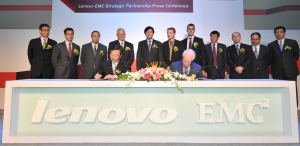
Two major IT brands, Lenovo and EMC, have collaborated on storage products in the SMB market by creating joint venture LenovoEMC.
LenovoEMC was originally announced last August as a part of a larger strategic partnership between the two companies. It will make use of business-class products from EMC’s Iomega line to provide co-branded network storage products for small and medium businesses, remote branches, and distributed enterprise scenarios.
The Iomega network storage portfolio includes desktop, tower, and rack mount products ranging from diskless up to 48TB of storage. The Iomega (now LenovoEMC) product line includes home office devices like the StorCenter ix2-dl, as well as much more advanced offerings like the StorCenter px12-450r (LenovoEMC might want to consider some simpler, catchier naming).
LenovoEMC’s NAS (network attached storage) solutions include the EMC LifeLine operating system, meant to provide SMBs with tools and features for managing storage without a full-time IT staff to administer it. LenovoEMC will pitch its line of storage options as a perfect match, of course, for Lenovo ThinkServer servers and ThinkStation workstations.
The new partnership is tailored to a market segment that could definitely use more attention. Small and medium businesses typically don’t have the budget or personnel resources for a dedicated IT staff, and can’t afford the exorbitant price tag of enterprise-class storage solutions.
LenovoEMC isn’t the only option, though–especially on the smaller end of the SMB spectrum, as smaller businesses often turn to consumer technologies. There are SOHO (small office / home office) NAS offerings like the Seagate BlackArmor, and fortified, disaster-proof storage options like the ioSafe SoloPro. Or, for a more scalable solution, SMBs can also turn to cloud-based options like Box or Dropbox.
Still, LenovoEMC appears to be providing a more robust range of products to serve the “business” part of SMB instead of the “small and medium” part. Lenovo, EMC, and Iomega are all brands with established credibility, and SMBs will likely welcome mid-range storage options that are both affordable and easy to manage.





